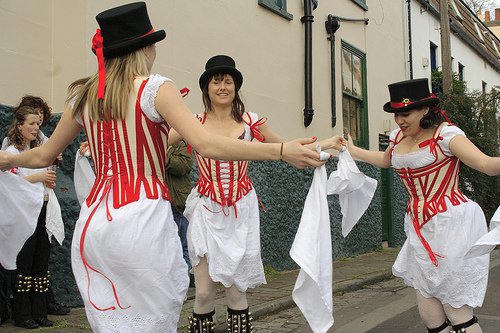
There's no doubt that Jez Butterworth's 'Jerusalem’ has been the biggest theatre event of recent years. Following a day in the life of the self-mythologising itinerant Rooster Byron (a superb Mark Rylance), what I found most intriguing wasn't that the audience was invited to sympathise with a drug-taking, dole-scrounging, suspected paedophile. No, what I loved was the way it brought to life a long neglected but very English mythology, conjuring up spectres of Blake, Milton, Gerrard Winstanley, the Green Man and the giants Gog and Magog stalking across ancient Albion.
Still, there was one moment that didn't ring true for me. One of the play’s slimier characters, the pub landlord Wesley, appeared onstage dressed in the bells and baldric of a Morris dancer. He's forced to perform a dance for the amusement of Rooster and his cronies, a symbol of the kind of twee, ‘biscuit tin’ version of Englishness that the play rails against.
What irked me was that Morris dancing, so long a shorthand for everything that's hopeless about English culture, is positively thriving. It's best represented by the Belles of London City (pictured) the Girls Aloud of Morris, who recently played Glastonbury with Thom Yorke in the audience and have featured in Zoo magazine. And when Morris dancing is being taken seriously again, you know you're in the midst of a serious folk revival.
Just a few snapshots of success: the banjo-wielding Mumford & Sons are expected to 'do a Coldplay'; the acoustic troubadour Laura Marling is set to be as big as Amy Winehouse; folk troupes like Bellowhead perform at the Proms, while Circulus play big venues dressed as medieval minstrels; festivals like Green Man and Field Day show young artists mixing traditional English tunes and electronica; it now seems de rigeur for every pub and venue to have a weekly folk night
The sight of young men in wispy beards and waistcoats and women in floral prints strumming acoustic guitars is now so omnipresent, it's worth thinking about what a bizarre development this is. The last outbreak of nationalism in popular culture was the Britpop/'Cool Britannia' axis of evil, with its genuflections towards the 60s of Carnaby Street and Morris Minors. But while Oasis, Blur and Supergrass looked back little further than the familiar canon of the Stones, Beatles and Kinks, now bands are mining the folk songs of the 19th century and coming up with gold (Bellowhead, for example, are obsessed with the Napoleonic Wars and the Peterloo Massacre, while the English folk singer Chris Wood says his favourite songwriter is 'Anon.'). And unlike the folk revivalists of the 70s (the likes of Fairport Convention and Steeleye Span), these bands deliberately eschew any links to American or Celtic folk, carving out a specifically English aesthetic.
In the words of the scene's spiritual godfather Billy Bragg, at its best this can be a 'progressive patriotism'. This is a celebration of Englishness as one cultural identity among many, tapping into an avowedly anti-imperialist and anti-establishment tradition. To sing in the voice of a sailor on his way to Waterloo, to revive the folk reels of the early 18th century or even dance round a maypole is a pointed two fingers to the enforced homogeneity of modern consumer culture. A bigger contrast to the faux mid-Atlantic twang of winners of The X-Factor is hard to imagine.
And this is a scene that is only going to grow stronger in the light of the economic crisis - folk music is the perfect soundtrack to sour times. Look at the winner of Radio 2's 'Best Folk Song of 2010', Arrogance, Ignorance and Greed, written by Show of Hands. The song fuses the power of propulsive folk rhythms with a damning critique of the banking system ('
your bonuses and expenses/You shovelled down your throat/Now you bit the hand that fed you/Dear God I hope you choke').
Of course, the revival of Englishness is fraught with problems. Show of Hands also wrote a song called 'Roots', a heartfelt plea for musicians to create modern English folk ballads. Unfortunately, to the utter horror of the band, the BNP shamelessly hijacked the song and its chorus 'We need roots' for use on its website (Nick Griffin has also advocated listening to another great English folkie Kate Rusby as 'an alternative to the multi-cult junk played incessantly on Radio 1', much to the singer's disgust).
But the new folk revival actually looks at other cultures with envy, not suspicion. The cloth-eared Griffin must have deliberately misheard the rest of 'Roots', which contrasts the joy that 'Indians, Asians, Afro-Celts' take from their native songs ('They're playing and dancing all night long/So what have they got right that we've got wrong?') with our own embarrassed sense of nationhood. Like 'Jerusalem', the folk revival isn't about the cultural superiority of 'Englishness', but rather to rescue a lost tradition, as savage and strange as Celtic or even Greek mythology.
'Jerusalem' ends with a rhapsodic Rooster summoning up the giants of old Albion to rescue their fallen land. And if Gog and Magog do return, they might be surprised to find a new generation of people celebrating native English culture – Morris dancers and all.
John Mullen is an arts television producer.
Read more
Get our weekly email
Comments
We encourage anyone to comment, please consult the oD commenting guidelines if you have any questions.